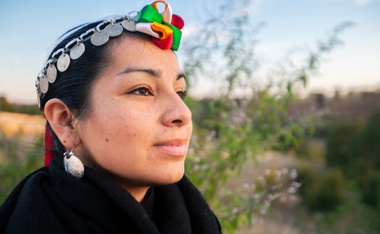In the multifaceted tapestry of human existence, adversity often serves as a crucible for unity. The Baḥá’í teachings encapsulate the profound wisdom that emerges from struggles, particularly within the context of marginalized communities. The Mapuche people of Argentina exemplify this notion; their narrative is a testament to resilience and an unwavering quest for harmony amidst tumult. This exploration seeks to unravel the intricate layers beneath the unity forged by adversity, as illuminated by the Baḥá’í principles.
The Mapuche, one of the prominent indigenous groups in South America, have long faced considerable challenges. Their history is fraught with colonial incursions, cultural suppression, and land dispossession. Despite these adversities, the Mapuche spirit thrives. Their experiences resonate with the Baḥá’í principle of collective consciousness, which emphasizes the interconnectedness of humanity. In times of strife, the propensity to unite often transcends individual distress, creating a profound communal bond. By examining their life, we can garner insights into adaptability, resilience, and the paramount importance of unity in navigating adversities.
One of the fundamental tenets of Baḥá’í teachings is the recognition of the oneness of humanity. This principle posits that divisions—be they cultural, racial, or ideological—are superficial barriers. The Mapuche’s struggle against external oppressors has necessitated a unified front; thus, their story exemplifies this teaching. Their societal fabric is woven from shared histories, traditions, and values, which fortify their identity against erasure. It is within this framework that we observe how collective distress fosters unity, compelling individuals to collaborate in the face of threats. The Baḥá’í perspective advocates that genuine connection emerges through shared trials, cultivating a deeper understanding and empathy among individuals.
Moreover, the Baḥá’í teachings stress the importance of justice and equity. The Mapuche community has, for generations, championed their rights in the face of governmental neglect and historical injustices. The Baḥá’í view valorizes the pursuit of justice not merely as a legal obligation but a moral imperative entwined with spirituality. This pursuit has galvanized the Mapuche people, instilling in them a sense of purpose and solidarity. They harness their collective strength to advocate for their rights, a narrative that reverberates with the Baḥá’í call for social action and upliftment.
As the Mapuche navigate their cultural landscape, they employ traditional practices that reinforce communal ties. Rituals, storytelling, and collective labor shape their social interactions and foster resilience. This cultural cohesion is mirrored in Baḥá’í practices that promote community service, collective worship, and interfaith dialogue. Both traditions underscore the significance of communal activities in nurturing unity and overcoming adversity. By engaging in communal endeavors, the Mapuche reinforce their identity against the backdrop of external pressures, illustrating the profound interconnection between cultural heritage and resilience.
The notion of education also plays a pivotal role in the Mapuche’s quest for unity. The Baḥá’í teachings advocate for universal education as a cornerstone for social progress. The Mapuche community recognizes the transformative power of knowledge; education serves as a vehicle for empowerment and self-determination. However, language and accessibility pose significant barriers. The Baḥá’í perspective on education emphasizes the need for diverse methodologies that honor indigenous languages and pedagogies. As the Mapuche seek to embed their worldview within educational frameworks, they not only preserve their cultural essence but also cultivate a generation equipped to navigate their unique challenges. This emphasis on knowledge production nurtures resilience and reinforces unity, as individuals come together in shared learning experiences.
Furthermore, the emotional and psychological dimensions of adversity cannot be overlooked. The Baḥá’í teachings recognize that personal development often flourishes in the crucible of hardship. The Mapuche people’s stories are laden with tales of loss, grief, and ultimately, healing. Their communal gatherings provide spaces for collective mourning and celebration of resilience. This emotional solidarity serves as a therapeutic balm, allowing individuals to process personal and collective adversities. The intertwining of emotional healing with collective action underscores the Baḥá’í principle of oneness, fostering an environment where individuals feel supported and valued.
In contemporary contexts, the Mapuche continue to embody the struggle for unity against a backdrop of globalization and modernity. They face new forms of adversity, including ecological degradation and cultural commodification. Yet, they remain resolute in their commitment to preserving their identity, demonstrating that unity is an evolving construct. The Baḥá’í teachings encourage adaptive responses to new challenges, promoting a flexible yet resolute approach to unity. The interplay between tradition and modernity illuminates the transformative potential of adversity; it acts as a catalyst for growth and connection.
To encapsulate, the narrative of the Mapuche in Argentina resonates deeply with the Baḥá’í teachings, inviting contemplation on the multifarious dimensions of unity in adversity. Their historical trajectory highlights the power of collective identity, the quest for justice, the transformative nature of education, and the important role of emotional healing. The Baḥá’í perspective enriches this understanding, urging a global consideration of unity that transcends superficial divisions. In recognizing the inherent interconnectedness of humanity, one arrives at the poignant realization that from adversity springs the opportunity for profound unity—a narrative that transcends borders, cultures, and eras.
Ultimately, the challenge lies in recognizing the shared bonds that connect us, particularly when confronted with adversity. The Mapuche people’s resilience offers not just a lesson in survival, but a guiding light for all who seek unity in the face of life’s inevitable challenges.
